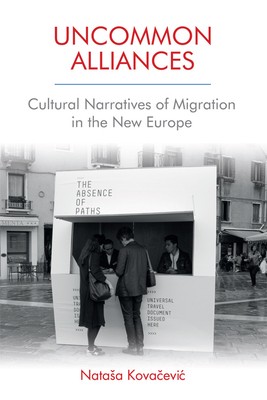
- We will send in 10–14 business days.
- Author: Natasa Kovačevic
- Publisher: Edinburgh University Press
- ISBN-10: 1474435882
- ISBN-13: 9781474435888
- Format: 16 x 23.6 x 2 cm, hardcover
- Language: English
- SAVE -10% with code: EXTRA
Reviews
Description
Examines European Union's neocolonial sovereignty in cultural narratives of migration
Uncommon Alliances: Cultural Narratives of Migration in the New Europe takes a critical stance toward both assimilationist and multicultural imaginings of community in the European Union that occlude neocolonial relations of dependence and exclusion. Bringing into conversation postcolonial and post-communist migration narratives from Africa, Asia and Eastern Europe, it aims to capture the emergent shift from national to postnational European space.
Through its examination of cultural texts, including works by Jamal Mahjoub, Mike Phillips, Laila Lalami, Mahi Binebine, Dubravka Ugresic and others, this book traces EU neocolonial practices in relation to European history, borders and guiding ideals of community, which exclude various 'others' from their symbolic imaginary. The book deliberately moves the discussion away from social-scientific approaches to humanities and offers a fresh intellectual framework for understanding multicultural identity in Europe.
Key Features
- Goes beyond traditional frameworks of cultural analysis (national, ethnic, or language-based) by focusing on narratives which take the European Union as a point of reference
- Shifts focus from narratives depicting interactions between different cultures to those imagining communities of solidarity based on common economic or historical marginalisation in the European Union
- Revises postcolonial theory by arguing that the European Union exemplifies a new, 'consensual' regime of colonial governance
- Offers poststructuralist readings of migrant narratives to go beyond the more common, multicultural approaches to such narratives
- Develops original perspectives on individual writers (Jamal Mahjoub, Mike Phillips, Laila Lalami, Mahi Binebine, Dubravka Ugresic, and others)
- Helps reorient European Union studies, dominated by social sciences, to the humanities side
EXTRA 10 % discount with code: EXTRA
The promotion ends in 4d.20:04:47
The discount code is valid when purchasing from 10 €. Discounts do not stack.
- Author: Natasa Kovačevic
- Publisher: Edinburgh University Press
- ISBN-10: 1474435882
- ISBN-13: 9781474435888
- Format: 16 x 23.6 x 2 cm, hardcover
- Language: English English
Examines European Union's neocolonial sovereignty in cultural narratives of migration
Uncommon Alliances: Cultural Narratives of Migration in the New Europe takes a critical stance toward both assimilationist and multicultural imaginings of community in the European Union that occlude neocolonial relations of dependence and exclusion. Bringing into conversation postcolonial and post-communist migration narratives from Africa, Asia and Eastern Europe, it aims to capture the emergent shift from national to postnational European space.
Through its examination of cultural texts, including works by Jamal Mahjoub, Mike Phillips, Laila Lalami, Mahi Binebine, Dubravka Ugresic and others, this book traces EU neocolonial practices in relation to European history, borders and guiding ideals of community, which exclude various 'others' from their symbolic imaginary. The book deliberately moves the discussion away from social-scientific approaches to humanities and offers a fresh intellectual framework for understanding multicultural identity in Europe.
Key Features
- Goes beyond traditional frameworks of cultural analysis (national, ethnic, or language-based) by focusing on narratives which take the European Union as a point of reference
- Shifts focus from narratives depicting interactions between different cultures to those imagining communities of solidarity based on common economic or historical marginalisation in the European Union
- Revises postcolonial theory by arguing that the European Union exemplifies a new, 'consensual' regime of colonial governance
- Offers poststructuralist readings of migrant narratives to go beyond the more common, multicultural approaches to such narratives
- Develops original perspectives on individual writers (Jamal Mahjoub, Mike Phillips, Laila Lalami, Mahi Binebine, Dubravka Ugresic, and others)
- Helps reorient European Union studies, dominated by social sciences, to the humanities side


Reviews